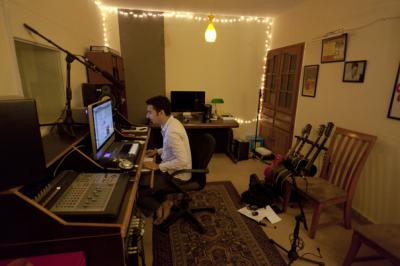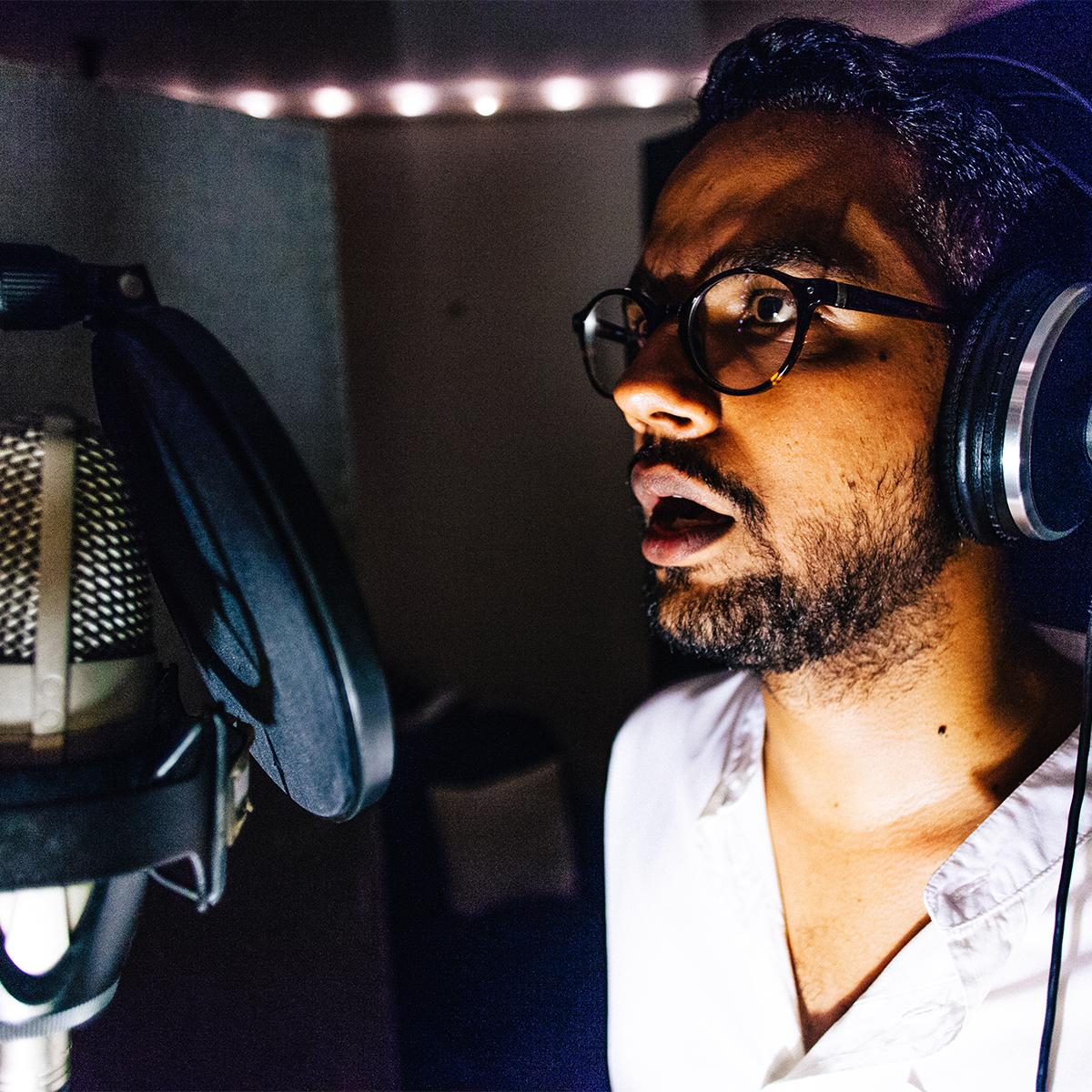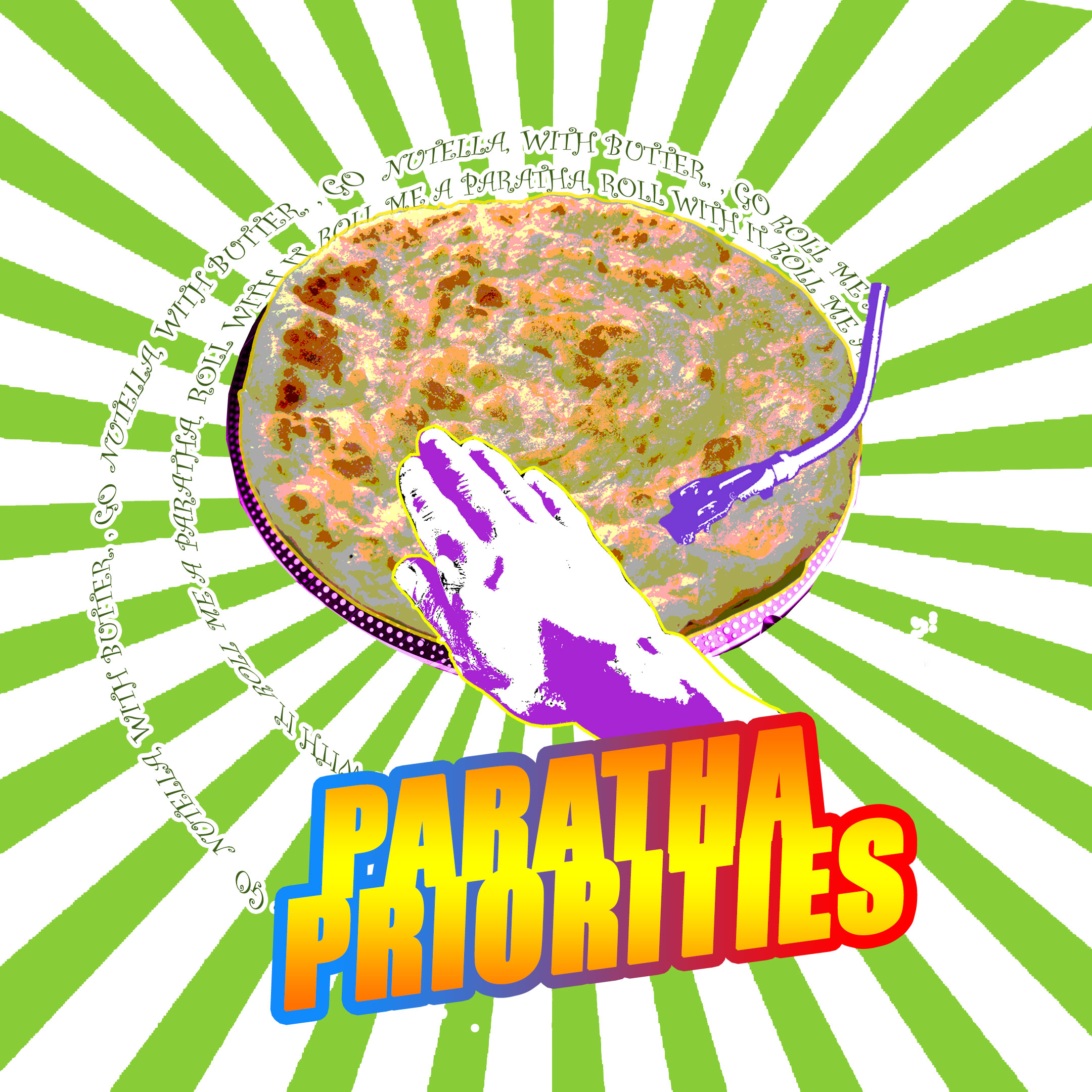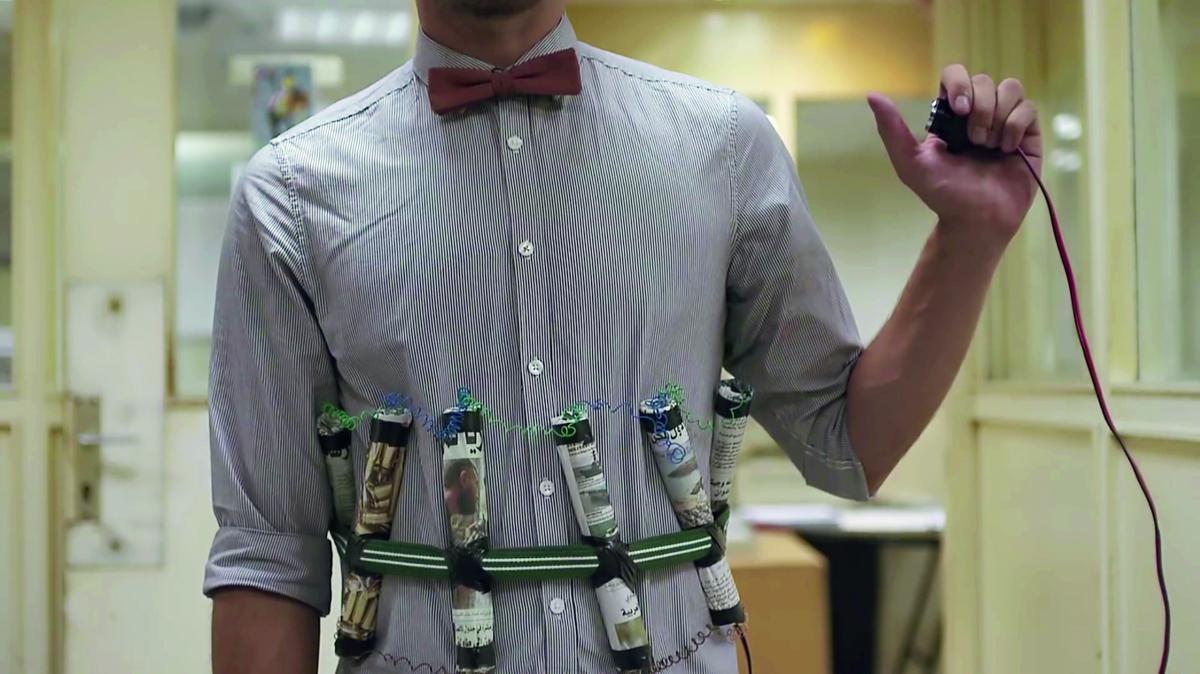Beirut based Syrian-Filipino rapper Nasser Shorbaji aka Chyno writes lyrics and produces video clips dealing with the Syrian Civil War, a suicide bomber, and other topics of the world he lives in. He quotes US rapper Tupac to explain his approach: «We’re not the people who are going to change the world. We are the people who are going to plant seeds to the people who will.» Chyno's album Making Music To Feel At Home is out on June 3, 2015. An edited version of this interview was published in the Norient book Seismographic Sounds (see and order here).
[Thomas Burkhalter]: Chyno, what does the title «Making Music To Feel At Home» of your upcoming album imply?
[Nasser Shorbaji]: I come from two different cultures. My father is from Syria and my mother is from the Philippines. Due to that I have sort of an identity crisis: who am I? Where am I from? In the Philippines, I’m not considered full Filipino, In Syria not a full Arab. I tackle this and other issues in my album: Where is home to me? Do I feel home within the liberties of the Western world – or within the liberties of Lebanon in contrast to Syria? Or is my home Syria, because I have lived there? Or is it the Philippines where I was born? I moved to Barcelona when the Syrian Civil War started in 2011. These questions became very relevant to me back then.
[TB]: In Beirut indeed, your position is special: There is the troubled historical relationship between Syria and Lebanon. And there are the many Filipinos working as housemaids in Lebanon, often under very bad conditions.
[NS]: Yes, it is a strange position, but it gives me topics to talk about. Being different can be a strength. In my video «O.P.P» for example I play a suicide bomber. It is a very sensitive issue, but that I’m not an Arab with thick beard softens the blow. You see a clean-cut guy with a tie, a regular person. I seem less threatening when talking about these issues. At the same time I’m credible to tell this story: I’m Syrian, I lived in Lebanon since 2003, I know these things happen.
[TB]: Would it be different if this video was done by an European or US based artist?
[NS]: It might feel weird to be talking about such an intense situation from distance. It felt strange when I was writing it in Spain. Kind of like a sport spectator telling an athlete how he should play the game. Literally one week after the release of the video the first suicide bombing in ten years happened in Beirut – by the Iranian Embassy.
[TB]: In your music and clips you often work around regional topics or even world politics. Can you try to describe your approach?
[NS]: I don’t like rappers that are preachy. I do not want to tell the listener what to do. In «O.P.P» I do not condone suicide bombing. But I create a narrative with an open ending. In the video you do not know if the suicide bomber commits his atrocity – even though the Arabic sample in the end of the track talks about a funeral. I put it as a dilemma: In the first verse the suicide bomber talks about the necessity of doing it. In the second verse he talks about his fear. [see lyrics here] Then it is about hypocrisy too: the religious obligation and the pseudo morality that comes with such an atrocious act – in reality he wants to blow himself up to give financial security for his family. So I try to observe, be poetic in my description, but not preachy. That is the essence of my message. I am not in a position to tell people how to live their lives.
[TB]: «O.P.P.» opens with a sample of the «O.P.P.» track by US rappers Naughty by Nature. Why this sample?
[NS]: It is the first hip-hop group I ever listened too. I play with their words: For Naughty by Nature «O.P.P.» meant «Other People's Pussy», in my version it either means «Other People's Property» or «Over Playing Politics».
[TB]: What are other audio samples that we hear in the track?
[NS]: One is from the Documentary The Cult of the Suicide Bomber. It is one of the many documentaries and articles I researched to come up with this track.
[TB]: Is it possible to go inside the skin of a suicide bomber?
[NS]: You know how in the US you watch all these news shows and movies about serial killers, and you are interested on how these killers are. I have the same interest in suicide bombers. What triggers them? What are the social and psychological implications? In Beirut I met people who were super liberal, and when things happen they want to get armed. One friend, a bar tender, got a call from another friend to join an armed militia. And then there is the craziness that comes from religious leaders. I put these elements together. I talk about what triggers the suicide bomber. I put a lot of underlying facts: it is about the cold in our houses because of bad insulation. It’s about Sheikh’s justifying our life. It’s about the little things that can trigger a person to go crazy. I want to show that humanity is very volatile. Normal people can change into crazy.
[TB]: Many musicians in Beirut kept telling me they are fed up with foreign journalists asking them about war [see book on music in Beirut: LINK ]. You seem to have a different opinion. Why?
[NS]: I was invited to this radio show in Lebanon and they told me not to mention the suicide bomber. I told them, but how? The whole song is about a suicide bomber? There still is this fear. Radio stations do not play political songs, so that unsolved issues of the Lebanese Civil War [1975-1990] war do not come up. But how can we solve problems if we don’t address them? They try to ignore the problem and hope it goes away. I live here, and it is my duty as a rapper to represent my environment. It is important to create music for your society.
[TB]: Why are your lyrics in English?
[C]: With my band FareeQ el Atrash we rap in Arabic. But English is my first language. I speak and think in English. I also feel that what I have to say is important to the rest of the world too.
[TB]: What is the scene about where you copy your head with a copy machine?
[NS]: The general idea was to create an office environment. It should be a normal office person not an Arab with a beard. And there is also this element of «I’m going to preserve myself before I blow myself up». This is a very Islamic way of looking at things. Kind of like: Preserve my memory before I blow things up. The photocopy is in line with this idea.
[TB]: Let’s talk about your latest video «Fight or Flight» that deals specifically with the Civil War in Syria. In the liner notes you write that this video «depicts the frustration of people in crisis whether within or fleeing their war torn country and the decisions they have to make.»
[NS]: In Barcelona I strongly felt what people in diaspora feel about their countries: They want to move back. They talk about what should change at home. It is the hypocrisy of the migrant - it’s ok, it’s human. So in this track I discuss the feeling of being outside of things. Would it be better to stay in your country and fight, or should you run and seek greener pastures? How bad is it to live in Barcelona, enjoying a normal life, smoking pot and partying, while we have war in Syria? People tell you to go fight and be honorable. But then, who and what are you fighting for? You fight, you die, or you get more kids, and they fight, and more people die. The song is about a big confusion. I use a lot of metaphors, rapid flows and wordplays to create frustration and uncertainty.
[TB]: So the complexity of the lyrics aims to resemble this chaos of thoughts, emotions, feelings, hopes?
[NS]: Yes
[TB]: Do you have family and friends still living in Syria?
[NS]: Yes, my uncles and an aunt live in Damascus. Some have left and then went back. Also friends of mine who have been in Beirut for a long time had to move back because they’re not making it easy for Syrians here.
[TB]: Is there something like an overall goal, dream or vision in your mind with «Fight or Flight»?
[NS]: In the video you can hear samples from the movie The Americanization of Emily from 1964. Samples like «War had made them gallant». The samples explain so well why war is wrong in general, how it affects people. The movie came out after World War 2, and it is basically an US general talking to a British lady. He tries to explain World War 2, and to me all of what he says resembles very much what we hear about the war in Syria.
[TB]: Do you feel that a work like «Fight or Flight» can be a small puzzle stone towards change in the Middle East? Or are destructive powers too strong?
[NS]: I’m going to paraphrase what rapper Tupac said. «We’re not the people who are going to change the world. We are the people who are going to plant seeds to the people who will.» I agree with him a hundred percent. We might not be the people to change, and we might not even have the mind frame for change. But art might spark something in youth that will make them change. Being hopeful for the future is one thing nobody can take away from us. The lyrics of «Fight or Flight» wrap up a lot of this, especially the second verse [see lyrics below]. I love irony and sarcasm. It puts things in perspective, and is far more powerful than preaching. The biggest source of news for people in the US are the The Daily Show with Jon Stewart, The Colbert Report, or Last Week Tonight with John Oliver. Everyone watches it. In my song «Haram» I talk about the hypocrisy of me leaving to Barcelona in a satirical way. I criticize myself and that makes the other person think. That’s what I like to do most.
[TB]: To travel and to cross borders is one privilege you have. In contrast to Syrians who flee their country and risk their lives in the Mediterranean when trying to reach Europe.
[NS]: Yes, I have luxuries refugees don’t have. But it’s also because of the work I put in. I was in Europe for the first time in 2008. I had left my banking job and joined a semi-professional theatre group. We performed in a few countries in Europe and the Middle East. And because I returned to Lebanon, the visa officials now trust me not to just flee the country – unlike for example Lebanese rappers Kitaa Bey-Route who stayed in France after a tour. – [see Norient article on a film by Jackson Allers]. I have friends in embassies too who vouch for me. I do not want to imply that I get visas easily. It's still harder for me than for a Westerner to get visas even to Arab countries such as Egypt, Jordan, UAE, etc… the list is long.
[TB]: You live in Gemmayze, one of the central suburbs in Beirut, with a lot of international people and bars. Can you really talk for or even about refugees and people in poorer areas of Beirut?
[NS]: This is why a talk from my own perspective. I’m talking about things that are happening to me, and I don’t want to put myself in other people’s shoes. I don’t say I speak for them because I don’t. They speak for themselves. I address things to them. «Fight or Flight» is like, this is for you Syrians. I am frustrated too. I don’t want to say that I feel like I share their grief because this would be a shallow thing to say. Yes, I live in Gemmayze. And yes, I do believe I’m a lucky person in a lot of aspects. But I also worked hard to be in a position like this.
[TB]: I ask this because after the 2006 war between Israel and Hizbullah there were many filmmakers from central Beirut that for the first time in their lives went to the Hizbullah dominated areas of Southern Beirut. They filmed the destruction like tourists, and then got invited to big festival overseas as «war artists». Some of them live in big villas, and it is nothing bad about that. But still it is another position that they are talking from, than someone in Southern Beirut who was bombed and feared for his or her live.
[NS]: Of course. My family would be considered middle class in Syria. We are probably better of than fifty percent of the population. But we deal with issues as well. When my family moved from Saudi to Syria they constantly lost money. The album is not called Making Music to get away from War. It is called Making Music to feel at Home and it’s simply just that. It’s a very personal thing. Even though I’m addressing all these issues it is a way for me to feel comfortable in my own skin. And yes, I’ll call myself a hypocrite. I call myself a little bit privileged. And by addressing that topic I don’t shy away from it.
[TB]: The work should speak for itself?
[NS]: Yeah. I also don’t know any rappers here who would invest money in their work like that. The videos I do are not as expensive as they appear. A lot of friends help me with this, often for free. Without their help these videos would cost me up to 12’000 US Dollars. I also go online and search for grants and funds, I write proposals, or I talk to companies. In this part of the world there is no formula that tells you how to be successful, especially as a solo rapper. So hopefully, we can create that with a team. Hopefully we can get into a position that’s unique and then create a blueprint for other artists. We are all pioneering right now. There is no underground scene that made it to the mainstream here. Everything around us is just very disgusting pop music. I don’t feel that’s our only identity.
[TB]: There is only Mashrou’ Leila that made it to something like a middle ground.
[NS]: True. And I like Mashrou’ Leila a lot. They're the type of band that reflects our society and I appreciate them. The same is with my band FareeQ el Atrash.
Lyrics «Fight or Flight»
(Verse 1)
Is it Fight or is it Flight?
– Exile! «Get the fuck out»
This X-files. Skullies get knocked down,
like «Let’s fight»! Being home sick got me less nice,
Euro trip got me feeling,
– You can’t quench your thirst with ice.
Let it melt. This heat inside,
made me leave home, but i’ll circle back
if i’m left without my rights.
– So, so. You fixing that back?
Oh, oh. You chiropractic?
No, no. Just wishing that Sham
take notes from what Cairo practiced.
– When i say sham, i mean Damascus,
my «sha’ab», I mean the masses,
is in a sham when the media ban
covers up what happened, and…
– «You don’t know what the fuck is going on»
So i call back home,
«but Pops can’t tell you on the phone»
that’s Boston crab, that means
– Everybody tapped, assets frozen,
relatives kidnapped, ransom paid,
but still he ain’t back, cash is gone,
international sanctions, can’t withdraw.
– War, War, that is War!
Tanks and guns right at your door
Enough little boys to win your war
Enough little girls to have some more,
… we don’t want more,
… Because that’s not pure.
We need baptism,
with Zam zam water.
– Let’s have some order.
Could i get some freedom and,
could i please get peace with that
without you tryna get a piece of that?
Can i get a piece of mind?
Can i get some sleep with that?
No rest for the wicked till,
I have my dreams come back,
(Verse 2)
Is it fight or is it flight?
– Exile!, Are you in?
Leave it all behind you and R-U-N.
Arguing, «Are you men?»
Are you if you
– stay home get strapped with arms and then
boots on laced up, like army men.
Move on next block, an apartment gets
shot up, so what if they are your friends?
– Excuse me sir, they were you friends.
Keyword is «were». When the war begins
you take up sides, when bridges burn,
can’t make amends.
– «We’ll pay for this». Plenty sins,
too many sins, no innocence
to replenish this, two words
to distinguish this
– «Exodus, Genesis»
Ironically, «Old Testament»
«Coincidence, Estimates»
«Conspiracies, Evidence»
– Don’t take much to start these kids.
Donate guns and promises.
Home made bombs and lots of shit
that go «Prapraprapra», and start a
– War, War, that is War!
Tanks and guns right at your door
Enough little boys to win your war
Enough little girls to have some more,
… we don’t want more,
… Because that’s not pure.
we need ablution,
with holy water.
– Let’s stop the slaughter.
I think we need to fast.
Can I please eat halal
without you tryna put beef with that?
– Can I see the greener grass?
Can I eat some cheese on that?
No picnic for the wicked until
I get to feed my fam



